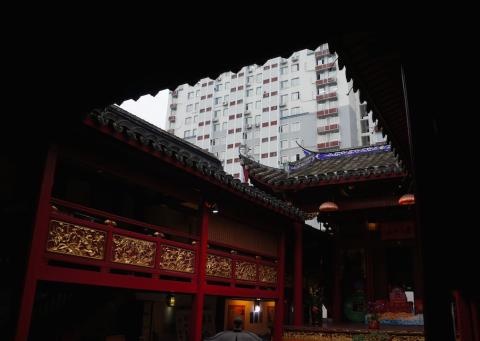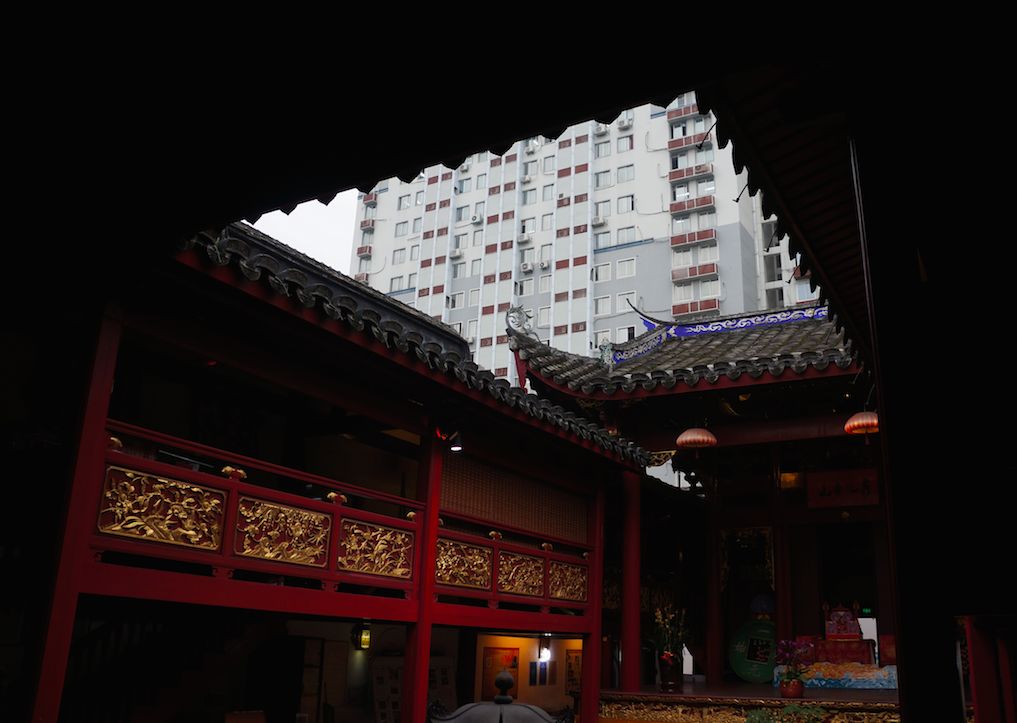

I really can't tell that everyone is a "foreigner"...
After leaving Mawei Shipyard, Liang Feng’s sister took us to a nearby free trade zone for lunch.
Cross-strait relations are heating up, and Fujian, as the economic zone on the west coast of the Taiwan Strait, is receiving meticulous care from the higher authorities. The policy is favorable. Last year, Fujian won three free trade zones (Fuzhou, Xiamen, and Pingtan) in one fell swoop. The core area of Fuzhou Free Trade Zone is Mawei. This area located at the mouth of the Minjiang River can be described as full of momentum. In the past, a "Westernization Movement" was vigorously promoted. Today, riding the ocean wind again, what kind of waves will it set off?

When a place makes a difference, traffic always comes first. Compared with Fuzhou city, Mawei's traffic is very modern, with one viaduct connected to another. The buildings on both sides also showed a new look. Along the way, we drove past many large-scale building complexes. Some were still construction sites, and some were basically completed, with building signs such as seafood and fruit and vegetable free trade zones. The building complexes The exterior wall is a continuous advertisement for investment. Buildings and shopping malls still look empty, with few businesses moving in.
We came across a building that had a "Seafood Free Trade Zone" sign on it. It was on the outskirts of a community in the 1990s, a food and drink street that grew out of the old living area. The two-story building has stores on the first floor, various restaurants, tobacco shops, etc. It is much more popular than the "free trade zone" seen along the road. Walking into a restaurant, the upstairs and downstairs were full of diners. Sister Liang said that they have often come to this restaurant for dinner for many years, and the seafood is very authentic.
Fujian people pay attention to hygiene. Before serving food, they bring a basin of boiling water. Diners should scald and wash their own dishes and chopsticks first. The Liang siblings treated us to a rich seafood feast, which they modestly called “Fujian snacks.”
Dong Qi said that she and Liang Feng stayed in Fuzhou for most of the year because they were making paint. Because of this, she said her weight loss plan always failed. When I stay in Fuzhou, I just sleep until I wake up naturally every day, and then repeat all kinds of temptations to eat every day: TV always shows the delicious and fun food in various districts; when meeting people to talk about things, they also eat and drink; friends come to Fuzhou, I still take it with me to eat and drink. A Shanghai girl who looks like Zhang Ailing’s classic photo with a slightly raised chin when she is quiet married to Fuzhou and knows all about the fun and delicious places in Fuzhou.

Many people compare Fuzhou with Chengdu. They are basin cities with good air quality. PM2.5 is generally 60 below. They are comfortable, slow-paced, and have a "eating" culture in the streets and alleys. Always looking for entertainment, living contentedly and peacefully in comfort.
However, Fuzhou is not as suitable for living as Chengdu. Due to the situation in the Taiwan Strait for many years, the city's infrastructure is not very good, and various constructions are currently underway. People who have just arrived in Fuzhou feel that Fuzhou is a big construction site, while many old Fuzhou residents and those who have settled in Fuzhou a few years ago are a little uncomfortable with it. In addition, Fuzhou's culture, technology and many other aspects have not yet caught up with second-tier cities, but housing prices and prices have to catch up with those of first-tier cities. I heard that the prices here, especially the high housing prices, are related to foreign exchange. Where there is more money, housing prices are higher. A large number of out-of-towners have made housing prices in Fuzhou and even the entire coastal Fujian area disproportionately high.
This high housing price reflects another side of Fuzhou, the opposite side of "comfort" - "struggle" and "struggle". This is also determined by the geographical environment of Fuzhou, which is "Linhai".
Before coming to Fuzhou, Dong Qi asked me what topic I wanted to cover. I said "Chinese immigrants." She asked around, hoping to help me find some entry points. At a recent gathering of friends in Fuzhou, she asked everyone if they had any stories about "Chinese immigration." A group of people here said that they are "immigrated Chinese", from the United States, Japan, the Philippines, Canada, Australia...
She was shocked. She couldn't tell that everyone was a "foreigner." One of the friends asked: "Which story do you want, old or new?" Dong Qi said: "The ones about going to Nanyang." The friend laughed: "Those are all old and dead!" and then told her about the current "one-stop" story. Service", "Smuggle to Hong Kong first..."
Walking down from Ningbo, I could smell some of the "Maritime Silk Road" and "private economy", but it wasn't until I entered Fujian and Fuzhou that the theme of "Chinese immigrants" that I wanted to explore just surfaced.

Although Fuzhou City is not close to the sea, but along the Minjiang River, the breath of the seaport hits your face. Changle, Fuqing, Lianjiang, Luoyuan, Pingtan, all have the atmosphere of the ocean. Fuzhou City and the city were blown by the sea breeze. The other side of Fuzhou’s struggle and struggle is given by the ocean. It is said that when you go to a Fuzhou family gathering and banquet, and your relatives talk to each other, you can always hear "Uncle is in Hong Kong...", "I heard that after your cousin came back from working in Japan...", "That's the one in the United States. My uncle, do you remember...", "He went to Shanghai to do business..." and the like. Be stable and conservative at home, and work hard outside. "Fuqing people are in Japan, Changle people are in the United States" is far from describing the reality, and the reality will only become more exaggerated. The United States, Japan, Hong Kong, Nanyang, Beijing, Shanghai... In the eyes of Fuzhou people, these places are places for hard work and drifting. Fuzhou, "is home, no need for hard work."
Fujian people like to interpret the word "Min" as "there is a dragon outside the door, but there are insects inside the door". When I first arrived in Fuzhou, just listening to two groups of friends chatting, I can feel that there are fighting legends from other places circulating in Fujian. It governs Fuqing, a county-level city under Fuzhou. It is said that most of the people there have immigrated or smuggled away. Fuqing people are also quite "fearful" in Japan. I heard a little story. When IPHON 6 was first released, someone couldn't grab it, so they asked a guy from the Fuqing Gang to help. The guy just handed a small note to the store and left it. Got more than a dozenIPHONE6. There is also a gentleman from Fuqing whose son is studying in Japan. The couple specially told his son not to say that he is from Fujian, let alone from Fuqing, and not to make friends with Fujian people. They feared their son would be recruited into a gang there.
After all, Fuzhou people always seem to have a hometown complex. They went out and wanted to come back. I have been so energetic outside, and now I have to return to my hometown in fine clothes. So in Cangshan District there is a group of foreign-style houses built by overseas Chinese who returned to their hometowns after becoming prosperous in Nanyang. In the countryside of Fuzhou, there are many spectacular "villas" that are neither Chinese nor foreign. The housing prices in Fuzhou city are catching up with those in first-tier cities... and there are many other houses in the city. A rich man who made a fortune in other places but lives in ease and entertainment in the streets of Fuzhou.

